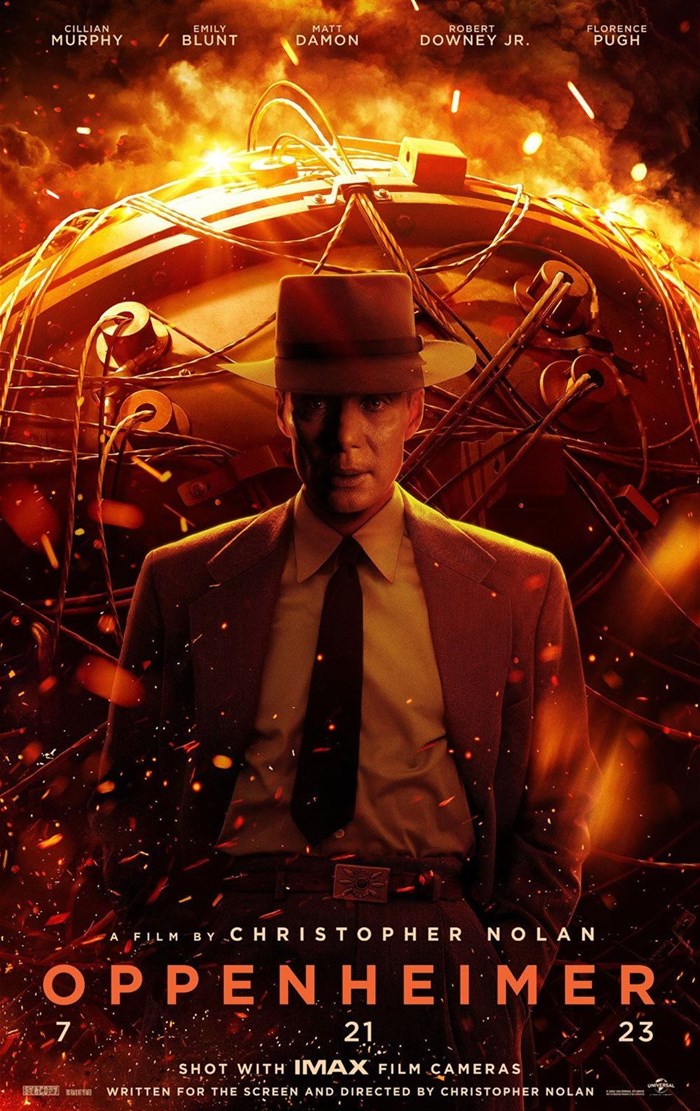
Image supplied
A biopic of theoretical physicist J. Robert Oppenheimer, known as the "father of the atomic bomb," the film finds its roots in the 2005 biography American Prometheus by Kai Bird and Martin J. Sherwin. The ambition and scope of Christopher Nolan’s interpretation of crucial moments in Oppenheimer’s life are immense. Within this dense and intricate period piece, timelines tangle, revealing Oppenheimer's multifaceted story.
Cillian Murphy’s portrayal of Oppenheimer captures a man enraptured by the boundless potential of science, only to realise too late the destructive power his creation holds. Like Prometheus giving fire to humans, he carries the weight of the bombs dropped on Japan and the knowledge that his creation might engender further devastation. Murphy excels in this role, his haunting expression and distant gaze in his piercing blue eyes becoming increasingly heart-wrenching as the film unfolds.
Accompanied by Ludwig Göransson’s score, these moments of guilt are both beautiful and horrifying. Oppenheimer’s character is meticulously unveiled, revealing the interplay between genius and torment that moulds his remarkable journey.
The film commences in 1926, with a young Oppenheimer studying under physicist Patrick Blackett (James D'Arcy) at Cambridge's Cavendish Laboratory. An anxious and homesick Oppenheimer leaves a poisoned apple for Blackett, only to reclaim it. The arrival of visiting scientist Niels Bohr (Kenneth Branagh) leaves an impression, leading to Oppenheimer's pursuit of theoretical physics in Germany, where he earns his PhD and crosses paths with Werner Heisenberg (Matthias Schweighöfer).
Upon returning to the US, Oppenheimer teaches at UC Berkeley, joins Caltech, and encounters his future wife, Kitty Puening (Emily Blunt). His involvement with Communist Party member Jean Tatlock (Florence Pugh) adds complexity to his personal life. The progression of Nazi nuclear advancements in 1938 compels Oppenheimer to replicate their work.
As WWII ensues in 1942, General Groves (Matt Damon) recruits him for the Manhattan Project. Oppenheimer forms a scientific team in Los Alamos, spurred by the Nazi threat. News of Tatlock's suicide reaches him. Post-German surrender, Oppenheimer supports using the bomb to end the Pacific war but dreads the consequences.
The Trinity test triumphs, culminating in the bombings of Hiroshima and Nagasaki. Oppenheimer becomes synonymous with the "father of the atomic bomb" title, yet remains haunted by the destruction it wrought. While he advocates nuclear restraint, President Truman (Gary Oldman) dismisses his concerns. Oppenheimer's opposition to the hydrogen bomb fuels Cold War tensions.
In a bid to diminish his influence, former allies betray Oppenheimer. Despite defence testimonies, his security clearance is revoked. Lewis Strauss (Robert Downey Jr.) orchestrates his downfall, but a flashback exposes Oppenheimer's authentic sentiments about his role.
Oppenheimer brilliantly fuses historical biopic with Nolan’s cinematic artistry. The cinematography encapsulates the essence of the World War 2 era, immersing the audience in a world grappling with the intricate interplay between intellect and conscience. Though the film's narrative structure is complex, it effectively portrays the nuanced layers of Oppenheimer's character. The recurring motif of resounding footfalls underscores the mounting sense of impending peril as the monumental implications of Oppenheimer’s scientific pursuits sharpen.
Nolan is known for his gritty Batman trilogy and his complex mindbending films like Inception, Interstellar and Tenet. Oppenheimer is reminiscent of 2017’s Dunkirk with the structure of 2000’s Memento. It was filmed in a combination of IMAX 65 mm and 65 mm large-format film and it’s spectacular to look at. The ensemble cast is a testament to Nolan’s pull in Hollywood. When he calls every actor worth their salt answers even if it’s for a cameo role.
Other than Cillian Murphy as the titular character, the standout roles go to Emily Blunt as Kitty, Florence Pugh as Jean Tatlock, Matt Damon as General Groves and especially Robert Downey Jr. as the vengeful and petty Lewis Strauss.
Oppenheimer not only met but exceeded my expectations. It delivers a cinematic journey that intricately weaves history, storytelling, and moral introspection. Nolan's direction, coupled with Murphy's haunting portrayal, vividly brings Oppenheimer's internal conflicts to life. The fusion of intricate narrative, immersive cinematography, and standout performances elevates the film to cinematic artistry that resonates deeply.
Oppenheimer serves as a poignant reminder of the intricacies of scientific advancement and the weight of moral responsibility. This masterful creation, rich in emotion and depth, stands as a testament to the power of storytelling and filmmaking at its finest.





























![Today, Halo and Demographica announce a new specialist agency, Second Rodeo]], headed up by Mike Stopforth (left). Dean Oelschig, managing partner and founder of Halo (right) says they will work as a group but ultimately, each agency will be an individual specialist](https://biz-file.com/c/2505/772543-64x64.jpg?2)



